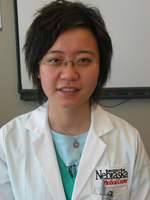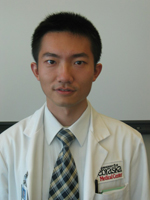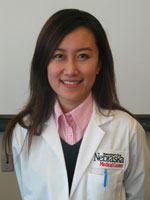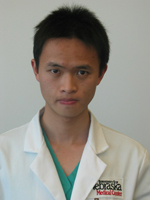The heart of the Asian Pacific Rim Development Program is the continued exchange of students between UNMC and Chinese biomedical institutions. The second delegation of four Chinese medical students finished their three-month rotation at UNMC in December.
In parting, these students left UNMC Today with some of their most lasting impressions about UNMC and America.
 Weijie “Rosie” Su (M-4):
Weijie “Rosie” Su (M-4):
“Americans have a very different way of interacting with patients than the Chinese. This gave me a new conception of my future specialty. I really liked how hard working the students were and how everybody is treated kind of like a brother. I think we showed the Americans how different it is to be accepted and to graduate from a Chinese medical university. It is extremely difficult to get into an 8-year program Chinese medical school unless you have a very high score. Americans have a greater integration in your universities. You not only consider test scores, but essays, volunteer experience and so on. Your exams are not easy to pass and it is not easy to graduate. Also, I think many elements of your training are more practical, instead of just textbook. I met a lot of kind people. I look forward to having UNMC students come to China and see our clinics and learn about our culture and what Shanghai really looks like.”
 Zhuang “Bruce” Ming (M-4):
Zhuang “Bruce” Ming (M-4):
“I made great progress in my professional medical English. I felt I could understand most of the discussions and meetings in the hospital. This helped me learn the most recent information more easily. I learned how to talk to patients more effectively because your doctors have a better ability to communicate with their patients and families. I found more Americans to be religious that I imagined. I ate some very good Chinese food in Omaha. The people of Omaha are very nice. I felt I was seeing the true American culture here. You can learn a lot about medicine at UNMC and take back something different to Chinese hospitals. I’ll always remember seeing squirrels and rabbits running along your streets and very clear sky and air in Omaha.”
 Lin “Linda” Ying (M-4):
Lin “Linda” Ying (M-4):
“The most important thing I learned from UNMC is the way to communicate with patients, how to make them feel more relaxed and to trust doctors. I learned to never hesitate to express myself, of course, in a proper way. This is a totally different place. Everybody should experience something totally different at least once in their life, especially young students. I found that oral English is very important and also knowing about American culture. Chinese educators should give young students more chance to practice and train them to be more independent. UNMC students and faculty are always very helpful and nice. They are willing to teach as much as they can. In the U.S., students feel free to ask questions and the ability of expression is better than Chinese students. I was proud to introduce traditional Chinese medicine to people here and also tell them a lot about the medical education system in China. I met wonderful people in Omaha and I will miss Omaha very much! I look forward to UNMC students coming to China where they see how Chinese doctors work and experience our food.”
 Wu “Julian” Liang (M-4):
Wu “Julian” Liang (M-4):
“The first time I heard a physician tell his patient, ‘You know what? This is America. You can do what ever you want,’ I was deeply impressed. The doctor suggested several choices of treatment and said, ‘It’s up to you.’ I started in the general surgery department at it was a nightmare at first. Here, residents and students start rounds at 6 a.m., whereas in China, the doctors don’t arrive until 7:30 a.m., and residents don’t have to be there earlier. I think American residents are overworked, but they do learn quite a bit more. I liked my attending surgeon. He would use prepared anatomical color sketches to explain everything to his patients. I don’t think any doctors are more respectful to their patients than American doctors. They knock before entering, introduce themselves and shake hands. They cover the body of the patient during examinations. I attended a conference about a resident’s life 20 years later after completing their residency. Nobody in China seems to think about the personal and career life of doctors in such detail. This was a tremendous experience for me. I will recommend that future Chinese students be given more advanced training in American culture, especially in medical school, such what to wear in the clinic and during working hours in the hospital. I think Chinese students should read a prescribed list of medical books before coming here. This will help them understand English medical terms better.”